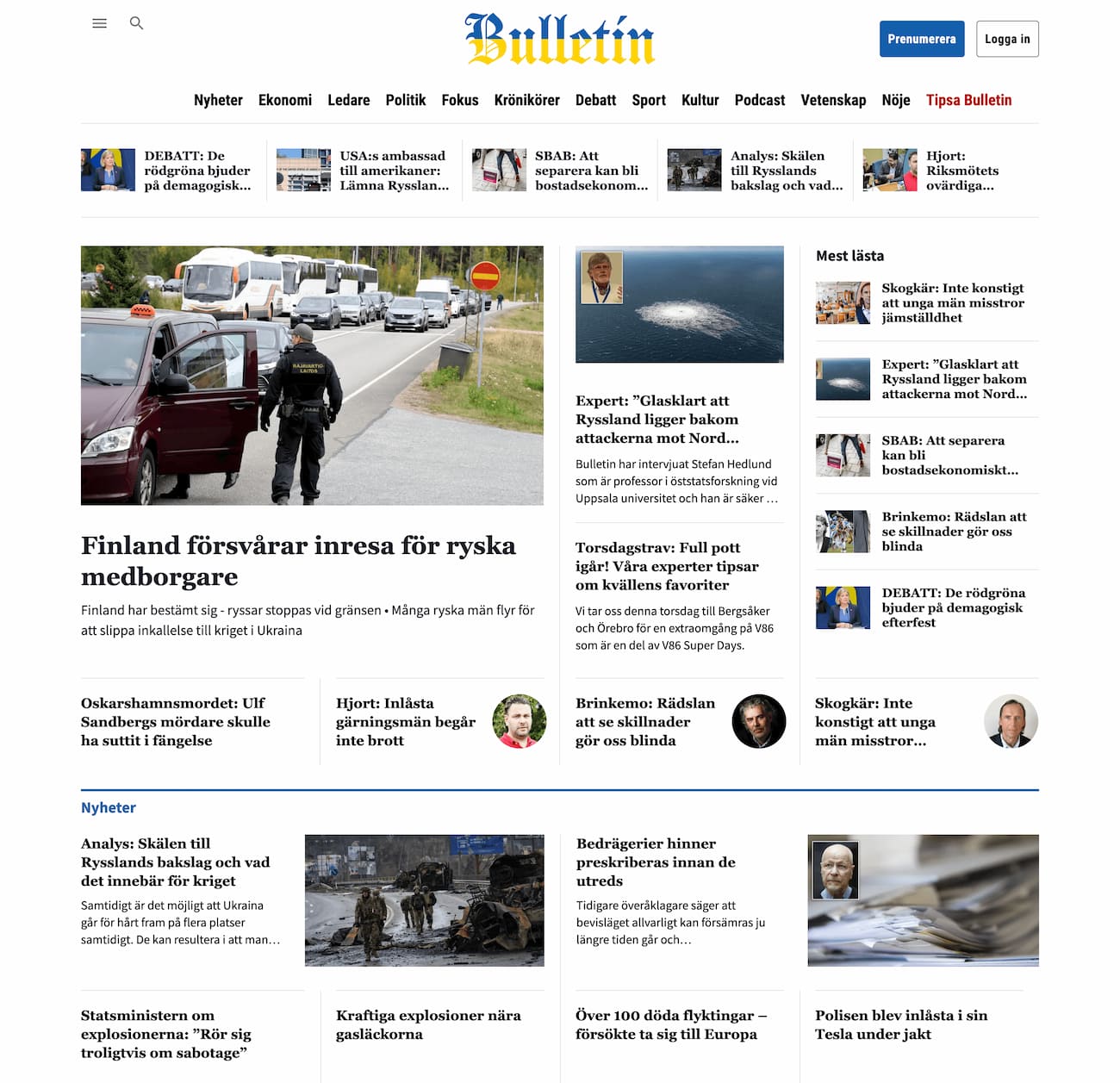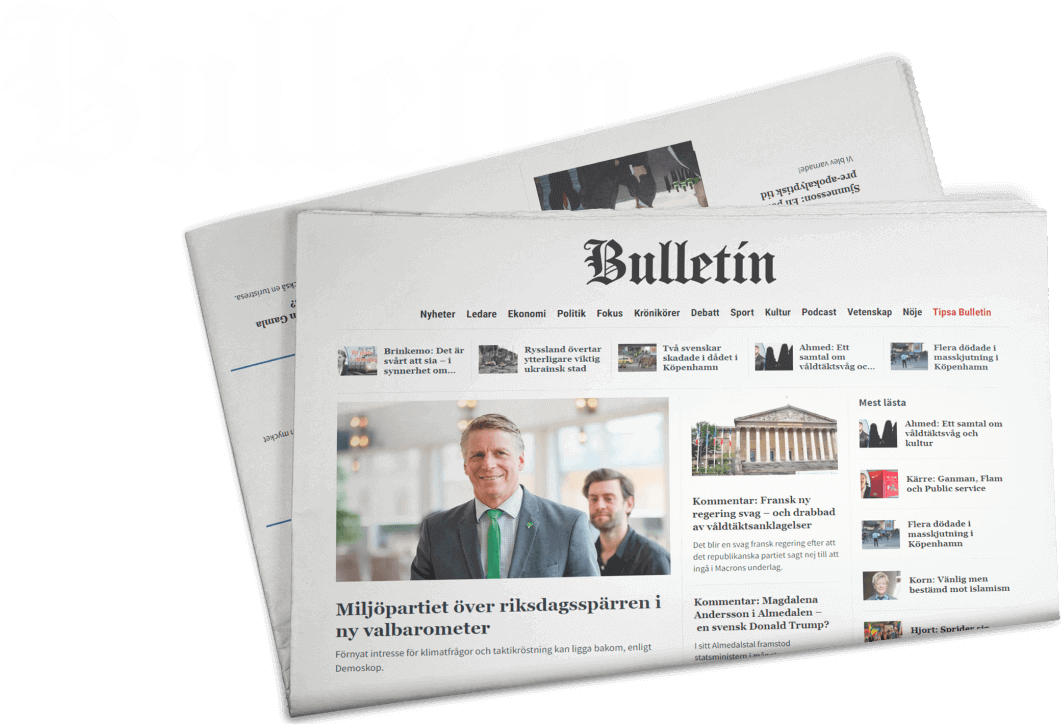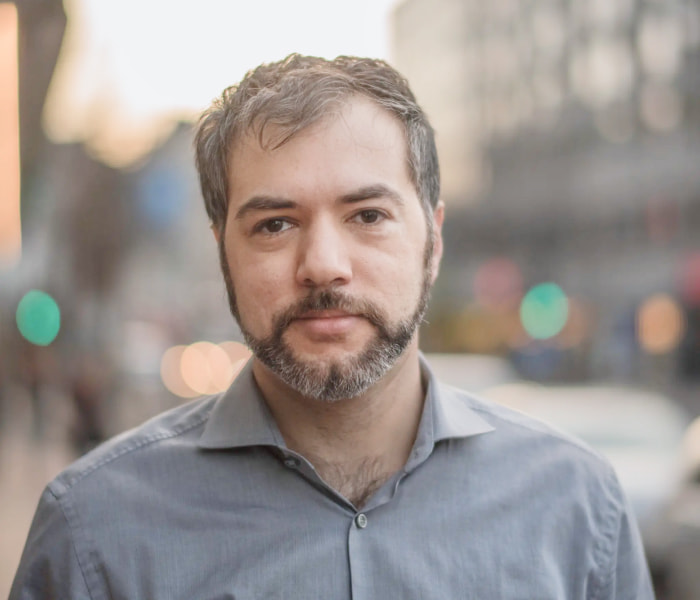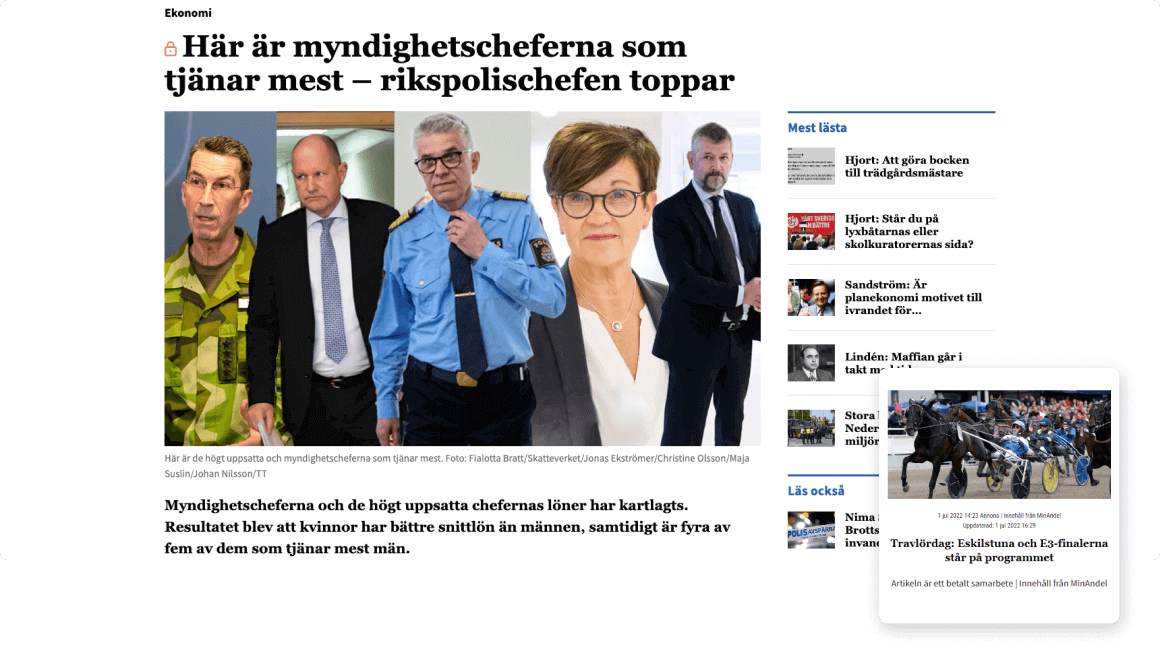NEWS AS A BUSINESS — STORY AND CHALLENGES OF BULLETIN

Tino Sanandaji is founder and owner of Bulletin, a Swedish online newspaper founded in 2020.
He is a researcher in economics and economics history, author of a book, and writer on political subjects covering topics of immigration and crime.

ANADEA
Tino, can you please tell us briefly about Bulletin’s story of creation? What inspired you to start Bulletin?
TINO
-
The core reason I wanted to create a newspaper is I was trying to change society. And my conclusion was that in the modern political system, at least in Sweden, it's not politicians who have power, it's the media.
Before, political parties used to be dominant. They were the ones who led the country. Now the media, including social media, creates issues and the political system follows.
Sweden is a country where there are many candidates but there are also many people both on the political right and left. 45% are on the left and 45% are on the right. These numbers go up and down, but it's divided like in most European or Western countries. -
However, the journalists and all the major serious newspapers are 85—90% on the left.
There are newspapers or news sites on the right, but they are low level. And in surveys, about 30% of the Swedish public says they don't like the news because it's too lefty.
So this is the niche I was going for. Otherwise, I would never start a newspaper — there are so many newspapers you would not gain profit just having started another one.
Another reason is that traditionally, whereas America and Britain have high-level newspapers like the Times of London, Telegraph, The Guardian, New York Times, -
Sweden doesn't have newspapers in this quality press category. We have traditional tabloids.
The difference is that a high-quality newspaper will pick more intellectual topics and try to be objective. It’s focused more on foreign politics, economics or science. Headlines are more subdued, informative, and calm. A tabloid will try to maximize the impact and clickbait. I wanted to believe that there would be an audience for highbrow intellectual news and in this way, we could also increase our credibility. That's the content part of the idea.

-
One more thing that mattered is digitalisation. Newspapers used to be profitable until the early 90s when if you wanted news, you had to buy a newspaper. On top of that, it was easy to make money on print ads. But the Internet with free news ate up their revenue so between 1990 and 2015 many newspapers went bankrupt. And the advertising died because it went to Google and Facebook.
But this was not the end of the news, it was the end of a business model. People don't stop wanting news. They want more news as ever and they still trust a newspaper more than Google. -
Instead of seeing the Internet as our enemy, we started thinking it's our friend. This is the idea pioneered by Nicole Miller from The New York Times, who was later an adviser for Bulletin. He also told us to do paywalls. People who love the product will pay for it even if they can get something else for free, he said. If you make your product good enough, you have a connection with your readers.
Another advantage is that with the Internet, the cost of distribution goes away. You can get thousands or millions of subscribers and each of them is pure profit. -
What's the most profitable segment of digital news? Is a newsletter. It was not obvious to us, but Nicole explained. It goes directly to the people's homes. They open their email; they trust what's there, and they won't unsubscribe because they're used to it.
Ads are just going to be a compliment now. It will not be the primary revenue source. The main is going to be subscription revenue. And to get people to pay for subscription, you have to build trust with them.
What readers want from a digital newspaper
ANADEA
Speaking of trust, how do you build it with your reading audience?
TINO
-
When we launched, I expected more engagement in international news. However, the demand for international news turned out to be not as big as I had hoped. I wanted people to like the things I like, to read about science and international development. But their interest in this was not that strong. On the other hand, we noticed the demand for very serious and intellectual topics. People care more about their own country, but they like to read articles that are serious, new and original.
If you look at the most read articles today, four or three are domestic and two are international. If we wanted to maximize our traffic, we could do fewer articles about international news.
But we try to give our readers what they want and do some in-depth international analytics from time to time.
I think what readers appreciate about our paper is that we treat them as intelligent. -
We don't talk down to them; we try not to make conclusions for them, which is what many people dislike about the existing news.
Most of the news has an agenda. It already has an opinion about whatever is being reported about. We try to give people facts and believe that people are intelligent enough to make their own conclusions.
Next, we believe strongly in freedom of speech. So we do not censor our writers and we are not afraid to talk about issues that are less controversial. Like, for example, race or immigration or global warming.
And we have also tried to do it fairly for both the left and the right. Traditionally, there is a lot of self-censorship in newspapers, but not in ours. We try to widen the corridor of opinion and sometimes allow articles that others wouldn’t.
-
Tino Sanandaji

Our principle is: any opinion is allowed if it’s supported by the facts. This is a different competitive edge. Our readers consider us courageous, they appreciate that we go against the mainstream and we have no agenda. We are not owned by any party. We do not affiliate with any organization or political party. This is an independence that people appreciate. We are honored by readers.
Editorial process at an online newspaper
ANADEA
Let’s talk about the inside of Bulletin. What does the editorial process look like?
TINO
-
Good question. This is the thing we put a lot of effort into. Our paper has a very clear line between opinion pages and various types of articles.
For an opinion piece, you need a Head of Opinion to read through it first. They don't want people to write the same articles or write something bizarre. A Head of Opinion reads the article once. Then, a law person should read it to verify there's nothing illegal — otherwise, they rewrite it.
Opinion is easy. You write 50 pieces, then you put them out several times a day. You can auto schedule them, actually.
News is much more difficult to organize. The Head of News plays a very important role. First thing in the morning, they give out roles to journalists, organize a schedule. We have to respond immediately when something happens, so we even hired one person in Australia so that they work when it's morning or night in Sweden. -
One reason why American newspapers and good English ones are maybe the best in the world is because the articles are more factually accurate. They have better research behind them, more layers of editing, and the role of editor is much more representative. Facts go first and the reader goes second. In Swedish tradition, the editor is weak and their main job is to defend the journalist against external criticism.
This is how the process works. We now have one Chief Editor and a Head of News. Both of them have a team. And the job of the Head of each department is very important. This person determines the content to a large extent. They also seek freelance people to bring in. We have been trying to be more international lately.
You know, all kinds of writers are involved. We had the former head of BBC and the former head of the American Democratic Party writing for us. We have had cynical eyes from Nobel Prize winners. -
But also, of course, we ask many Swedish people to write for us. So if I see somebody writing something interesting online, I go talk to the editorial staff. I try not to micromanage the content, but if I read somebody say something interesting on Facebook, I might say, ‘Why don't you write an article for us? I think our readers would like that.’
It was not always smooth, however. There was news by a blogger that the head of one party was convicted for the crime of drug possession and arms. Our reporter saw this and asked one of our editors, ‘Should I write this?’ Because this was controversial, we had to fact check it. That person was in a database of people convicted for crimes, so the article was approved. But it turned out to be a coincidence. That person had an identical name, was of the same age, but it was not him. When protests went viral on Twitter, the editor immediately unpublished the article. Of course, we apologized to the guy and then we invited him to write for us. And he did.

ANADEA
What’s the role of a content management system in your staff’s work? Does it help to tune it?
TINO
-
Our system is very integrated because we are digital news. Authors write everything inside this system, it has many functionalities that make their job easier, spell check included.
One of the biggest debates we had was whether we should have built a data system from the ground up or using WordPress. -
WordPress is cheap and easy to use. Journalists know how to use it. But I asked experts, and they said that in the long run, we’d be better off building our own system. We’d have more flexibility. We’d add to it more and have no bugs, so this is what we did.
-
And look, if journalists know how to use WordPress, we’ll just do an interface that looks like WordPress. Our system looks similar to it but is better on the inside. In our system, writers can see each other's articles. The editor can see the article and put it in the planning. It tracks all the articles, so if you retract or something, it's there.
Digital news is an IT business
ANADEA
Overall, what is the role of the technical side in a business like yours?
TINO
-
The modern newspaper that is read online like us is almost as much an IT company as a news company in terms of what brings us revenue. 60—80% of our readers read us on mobile so the reader’s experience and our ways to make money depend directly on coding.
For example, with a good interface, we can see what articles people like most. We have an algorithm that promotes most read and hides less read ones. All of this had to be developed. The way we integrate ads has to be developed, how we put articles on Facebook, counting traffic from social media has to be developed. Also, it is very important to do SEO.
It was difficult for us to find programmers to do all of that. We wanted to design a newspaper knowing nothing about it ourselves. -
And then we needed a website development company that had people who could think for themselves, not only to program.
We composed a standardized letter describing our project and emailed it to maybe 20 companies and then evaluated their answers. How good was their English? How well did they understand the task? How professional was the answer? Then we picked four or five companies and interviewed them. Ultimately, Anadea was the best. Here's The New York Times, copy it for us, we said. And eventually they did it.
You know, it's not just code. It's something beyond that. In a long-winded way, it's very important to have good programmers. Good programmers is not only a technical question, it's a question of understanding the end product and thinking creatively. And that's very rare. -
I was criticized for not putting the development in Sweden. Sweden would be closer and more convenient — and not that much more expensive. However, Anadea came much easier to work with compared to Swedish companies. Swedish developers would fight me if I told them to do things my way. They are like artists. Creating is okay, but I already had my vision. I needed someone practical-minded and client-oriented.
This is the reason I would recommend Anadea. At the end of the day, many clients will not be IT experts. They're going to specialize in various fields, like news and economics in my case. It's good for me to have somebody who is creative and intelligent enough to understand my field, enough to communicate with me, and who can think, ‘okay, this guy needs this.’ From my experience, it’s easier said than done.
ANADEA
What would you have done differently for Bulletin looking back?
TINO
-
My biggest mistake was that I brought in my friends and gave them stocks. It was not professional enough. And I was terrible at recruiting people.
-
First of all, I should have kept all the control, and second, I should have done the recruiting. Not hire people I know but people I need.
-
Also, we should have launched later. Another one, I didn't realize so many people would be so angry about us doing so much international news. We should have focused a bit more on domestic news from the start.
ANADEA
Can you please share your goals for Bulletin for the near future?
TINO
-
Now I’m focusing on recovering from the damage done by infighting and making Bulletin financially stable. The second goal is to grow our readership back and beyond where we were. And the third one is to scale up to improve the design and grow the number of reporters. It's really a continuation along a tangent, but our long-term goal is to become a major Swedish newspaper, one of the largest and most trusted in Sweden. That’s our goal.
ANADEA
Tino, what are the 3 things that come to your mind when you hear 'Anadea'?
TINO
Professional. Technically skilled. Reliable, like if I give you a task, you'll do it.
And one more thing, you are self-going. See, I'm lazy. I have my things to do. I assume self-going is good because you do things I don't think of, you suggest doing something better than if I would have given you a bunch of suggestions.
Don't dream of it, work for it!
Game-changing apps start here. Tell us about your project.
Send us your request for proposal, and we'll reply with the estimate.
Need more
inspiration?
Read more success stories









